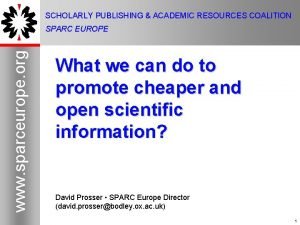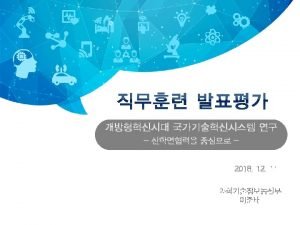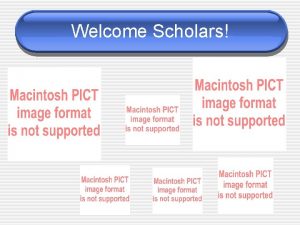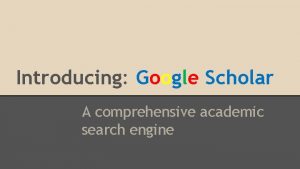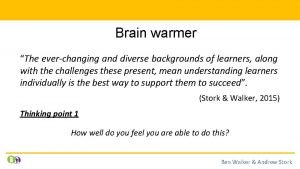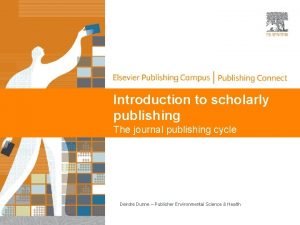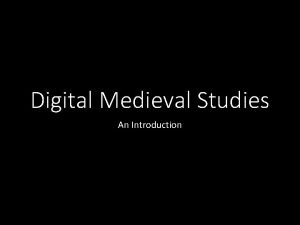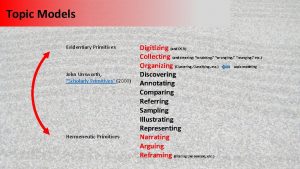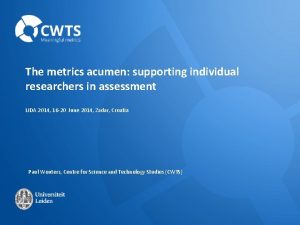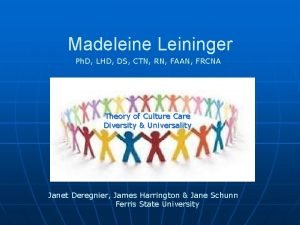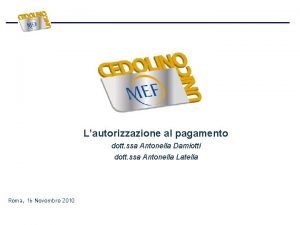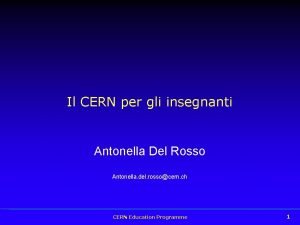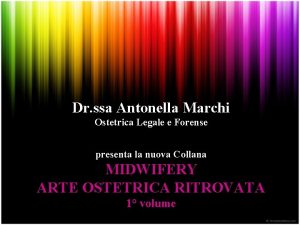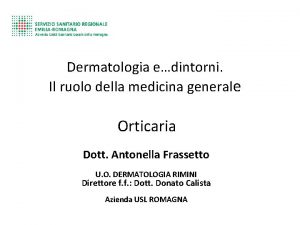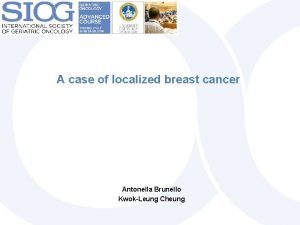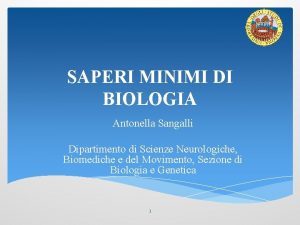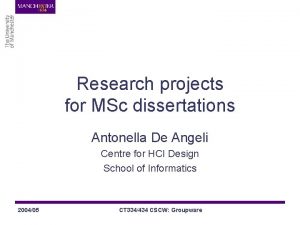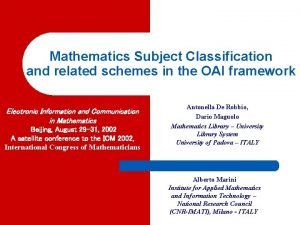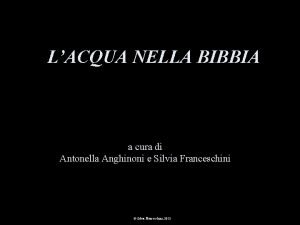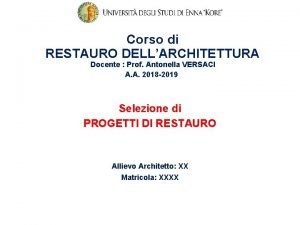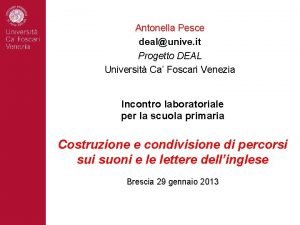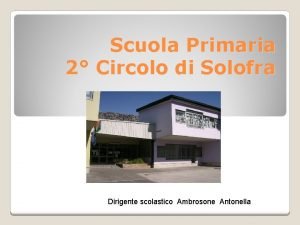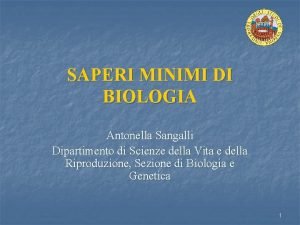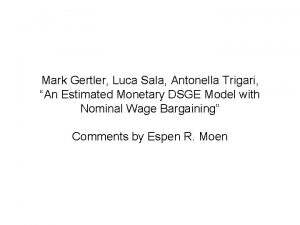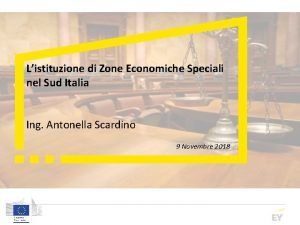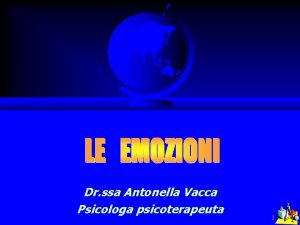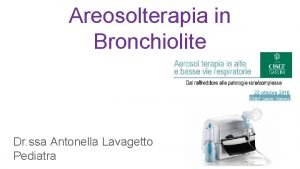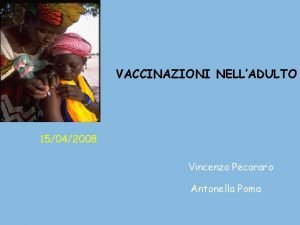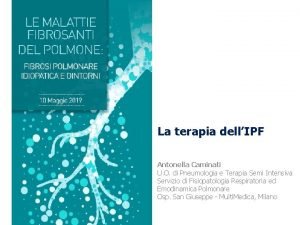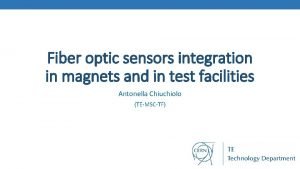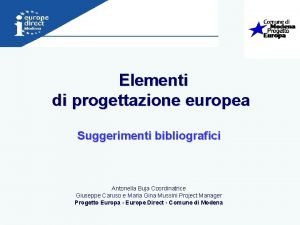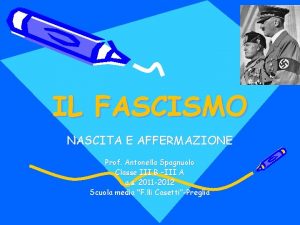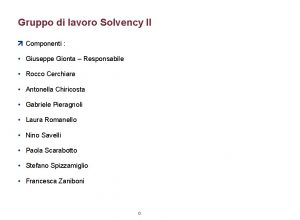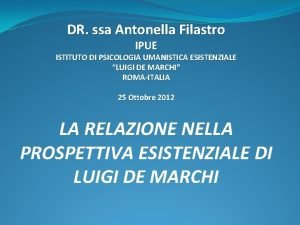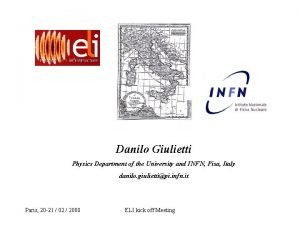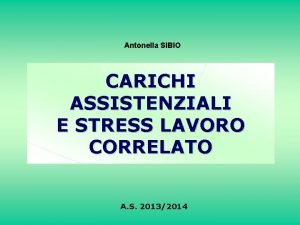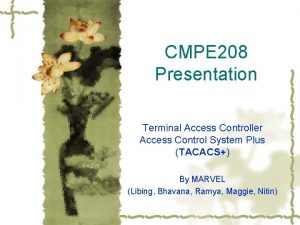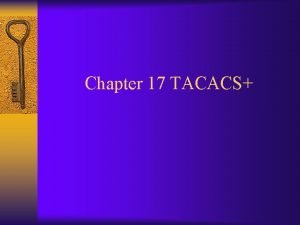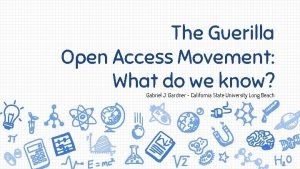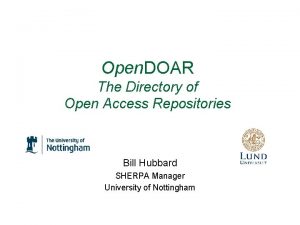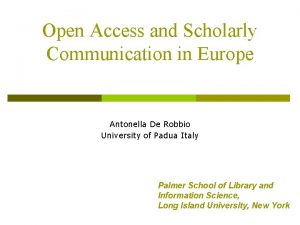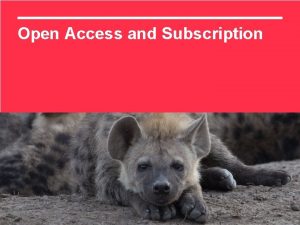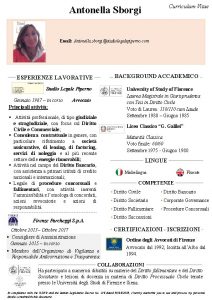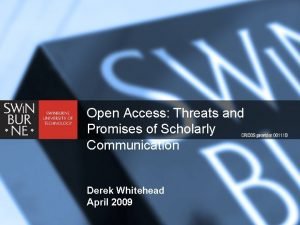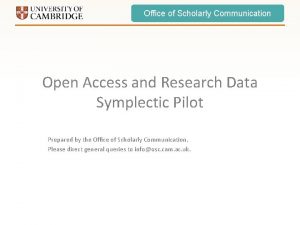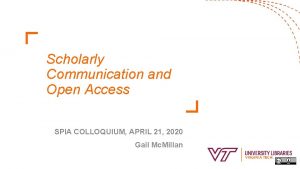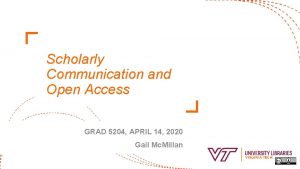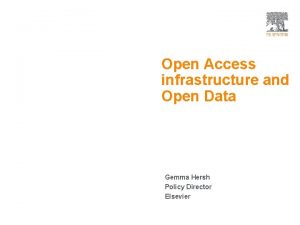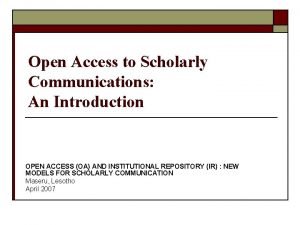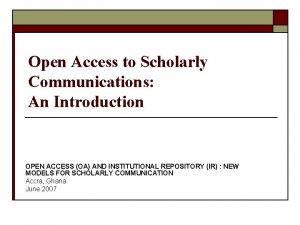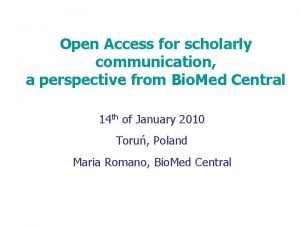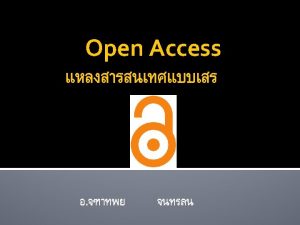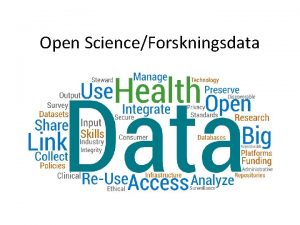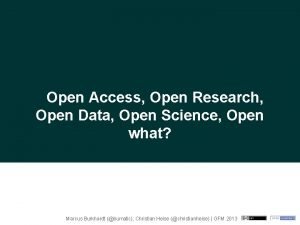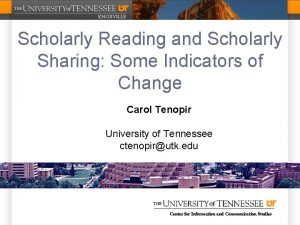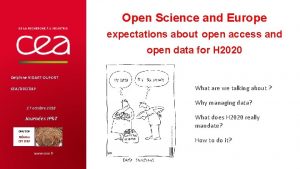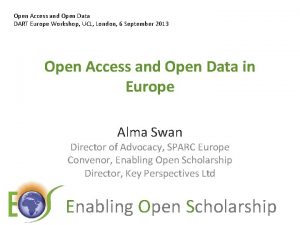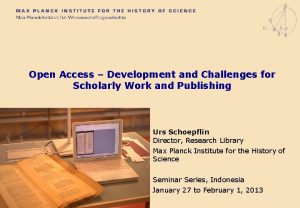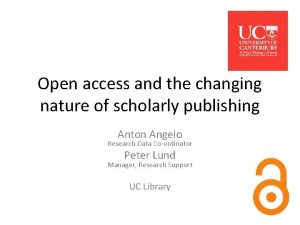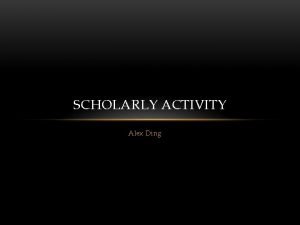Open Access and Scholarly Communication in Europe Antonella













































- Slides: 45

Open Access and Scholarly Communication in Europe Antonella De Robbio University of Padua Italy Palmer School of Library and Information Science, Long Island University, New York

Open Access for Scholarly Communication What “Open Access” mean ? - Readers can browse, read, download fulltext for free - The economic model is different: the Author pays (or the institution, or the learned society…. ) - Two paths for OA publications: * istitutional repositories and disciplinary open archives * open access, peer reviewed scholarly journals - Copyright is not transferred (or not completely) to the Publisher

Definition of Open Access p p from Bethesda Statement on Open Access Publishing (April 11, 2003) Open access is a property of individual works, not necessarily journals or publishers. Community standards, rather than copyright law, will continue to provide the mechanism for enforcement of proper attribution and responsible use of the published work, as they do now. An Open Access Publication is one that meets two conditions…

First condition p The author(s) and copyright holder(s) grant(s) to all users a free, irrevocable, worldwide, perpetual right of access to, and a license to copy, use, distribute, transmit and display the work publicly and to make and distribute derivative works, in any digital medium for any responsible purpose, subject to proper attribution of authorship, as well as the right to make small numbers of printed copies for their personal use.

Secondition p A complete version of the work and all supplemental materials, including a copy of the permission as stated above, in a suitable standard electronic format is deposited immediately upon initial publication in at least one online repository that is supported by an academic institution, scholarly society, government agency, or other well-established organization that seeks to enable open access, unrestricted distribution, interoperability, and long-term archiving.

from Peter Suber FOS Open-access (OA) literature is digital, online, free of charge, and free of most copyright and licensing restrictions. What makes it possible is the internet and the consent of the author or copyright-holder. p OA is entirely compatible with peer review, and all the major OA initiatives for scientific and scholarly literature insist on its importance. p

Two channels of the Open Access There are two primary vehicles for delivering OA to research articles: p OA journals n n p Creation of e-journal Open Access tools Support for OA e-publishing (economic alternative models) OA archives or repositories n n There is now open-source software for building and maintaining OAI-compliant archives Each University must create one or more repositories

Open Access Journals DOAJ: The Directory of Open Access Journals is a clearinghouse for free, full-text, quality-controlled scientific and scholarly journals. p There is now open-source software for building and maintaining Open Access journals p

Open Archives p Data Provider DP n n p Institutional repositories Disciplinary repositories Services Provider SP n n n harvesters services for cross searching tools and platforms

Recent developments in OA From hard discussions and contrasts to a “shift in tone”: - it increases research impact - it is considered an opportunity by the Learned Societies publishers - its economic model may be sustainable - it may not increase the Digital Divide between developing countries and wealthier ones - it is a choice for Authors: they decide

12 -18 Months Impact cycle begins: Research is done Researchers write pre-refereeing “Pre-Print” Pre-Print selfarchived to University’s Eprint Website Submitted to Journal Pre-Print reviewed by Peer Experts – “Peer. Review” Pre-Print revised by article’s Authors Refereed “Post-Print” Accepted, Certified, Published by Journal Researchers can access the Post-Print if their university has a subscription to the Journal by Tim Brody pictures Post-Print selfarchived to University’s Eprint Website New impact cycles: Self-archived research impact is greater (and faster) because access is maximized (and accelerated) New impact cycles: New research builds on existing research

Open Access in Europe The strongest initiatives: p ROmeo project - UK, SHERPA - The Netherlands: Project DARE - Nordic Countries: collaboration and the Nordic Conferences on Scholarly Communication - Germany: the Berlin Declaration and the standardization effort (DINI: (German Initiative for Networked Information) The Role of the CERN OAI Workshops Memberships to SPARC Europe

Il progetto Ro. MEO

Romeo Deliverables p p Ro. MEO Studies 1: The impact of copyright ownership on academic author self-archiving p p Ro. MEO Studies 2: How academics wish to protect their open-access research paper p p Ro. MEO Studies 3: How academics expect to use openaccess research papers p p Ro. MEO Studies 4: An analysis of Journal publishers' Copyright Agreements p p Ro. MEO Studies 5: IPR issues for OAI Data and Service Providers p p Ro. MEO Studies 6: Rights metadata for open-archiving

4)Politiche in merito al SA


Zwolle: objectives p p p To assist stakeholders—including authors, publishers, librarians, universities and the public —to achieve maximum access to scholarship without compromising quality or academic freedom and without denying aspects of costs and rewards involved. The Zwolle Group is working with academic authors, institutions, publishers and libraries in order to develop and promote balanced approaches to the management of rights, thereby establishing optimal access to scholarly information. Seven principles

Zwolle principles dicembre 2002 Principles - Copyright and Universities “The academic community embraces the concepts of copyright and fair use and seeks a balance in the interests of owners and users in the digital environment. Universities, colleges, and especially their faculties should manage copyright and its limitations and exceptions in a manner that assures the faculty access to and use of their own published works in their research and teaching. ”

7 strategical issues 5 stakeholders 1. 2. 3. 4. 5. 6. 7. Instructional uses Future reuse Intangibile Rewards Financial issues Access issues Quality issues Administrative issues Authors 2. Universities 3. Publishers 4. Users 5. Libraries 1.

chart is an effort to articulate many of the most significant interests, held by various stakeholders, in the creation and dissemination of scholarly works created at the university.

The effort to identify stakeholders and their interests is a crucial step toward the development of policies or agreements that seek to assure to the stakeholders the ability to use and manage the works in fulfillment of their most important interests

Closed or Open? p These are all important issues for "closed" content. Actually, for completely "open" content, most of the above wouldn't make much sense. p balance access and distribution with the need to manage and control their intellectual property rights and digital environment asset repurposing content into diverse distribution channels to maximize revenue for service providers sharing and re-using content for learning and teaching purposes (generally this means through "institutional" settings, not in the general sense of self-education) allow copyrighted content to move from device to device without uncontrolled copying the possibility of multiple choices and options, from simple adoption of OAI-PMH protocol and metadata indexing to "content publishers" (Digital Asset Management Systems, portals, content management systems and unstructured data-handling solutions) p p

Licences? A lot of content that we might call open is actually "semi-closed". p It's important that we realize that Creative Commons, the GNU documentation license, and others are on the "closed" side of the content world. p


Metadato RDF Selezione della licenza sulla base di criteri scelti dall’autore Le tre viste della licenza CC: - per utente finale - uso legale - per utente macchina Il codice XML genera il marchietto CC che accompagna la risorsa

Open Access in Italy p p Messina conference The OA activities carried out in Italy can be divided into the following areas n n n Institutional and Open archives (data providers) Open Access journals Service providers Promotion & Advocacy Critical Issues Future developments

Messina Conference p p p The OA movement in Italy has an active participation in single universities, research centres and supercomputing consortia. A conference promoted by the Italian Council of Rectors held in Messina on November 4 -5 represents the first official action of the Italian universities rectors in support of OA. Here University Rectors gathered at Messina University signed the Berlin Declaration. 34 Universities signed the Messina Declaration (follow Berlin Declaration) Up to now over 64 Universities have formally adopted the initiative (only 13 are not present)

Open Access in Italy


Institutional archives & Open Archives p Institutional Archives n Constantly increasing p p p n p Sw: Eprints (Bologna, Firenze, Messina, Padova, Trento) + Cnr Bologna, Scuola Superiore di Catania, SISSA + CASPUR Sw: Dspace (Parma) Sw: CDs. Ware (Roma “La Sapienza”, Messina) Type of material: articles pre-print, doctoral theses, teaching material, technical reports, working papers, conference proceedings, miscellaneous ( multimedia documents covering the cultural and scientific production of the university Disciplinary Open Archive n E-LIS (Library & Information Science) p sw: eprints

Open Access Journals Development of sw for creation and management of e-journal p p p Freely accessible academic journals n Fragmentary context n not standard compliant “Open Access” Journals n Compliant with the Budapest Open Access Initiative n Quality control, OAI- PMH compliant Critical issue: being economically sustainable n see SISSA JHEP- Journal of High Energy of Physics n See Journal of the Pancreas DAFNE and Zpub for Rendiconti del Seminario Matematico UNIPD AEPI project: an Italian Platform for electronic publishing

Service Providers: infrastructures, services and tecnologies p CILEA – Iniziativa AEPIC (Academic E- Publishing Infrastructures) n Infrastructure for the planning, creation, managing of Open Archives, OA journals p CILEA & CASPUR n Italian Platform to access open archives and institutional archives PLEIADI- Portale per la Letteratura Elettronica Italiana Archivi e Depositi Istituzionali/Portal to the Italian Electronic Archives and Institutional repositories

PLEIADI: an Italian SP The platform, named PLEIADI ( Portale per la Letteratura Elettronica Italiana Archivi e Depositi Istituzionali - Portal for the Italian Electronic Literature in Open and Institutional Archives) The portal offers end-users a federated search of Italian and foreign institutional archives and of general OAI compliant archives, news feeding and alerting services, helpdesk on copyright issue, statistics, citations parsing, and in the near future export facilities, bibliographic formatting, etc. will be available. A copy of the original project is available electronically in English on the AEPIC website. Originally the project was carried out only by CILEA and some months later CASPUR joined.


PLEIADI: objectives • to improve access to the academic/content distributed in various open archives in Italy (data providers) • to create a national platform for access to the various data providers through a unique interface delivery of value added services to the Italian academic and research community (service provider) • The services: a portal, harvesting, indexing & information retrieval, gateway Z. 39. 50, metadata crosswalks, gateway metacrawlers, UTF-8 mapping. • In the future it will also provide export services to different formats and legal deposit.

Architettura – PLEIADI- Presente e Futura document archiving ta Da m et ad at a fe ed in g t men age man n io t ta en em pl im User A m dde et dad va at lu a fe e ed in g t en em ag an m CILEA CASPUR t en d m op l e ev • Access management • Alerting • News feed • OA-relevant info • Forum management WG • Implementators VRD • Developers’ test bed Portal • Italian OA list Portal ov Pr • Harvesting • Classification • Caching • Indexing • OPAC • Citation Parsing • Open URL • Metadata crosswalks • Gateway for crawlers • Full-text search • Statistics • Export facilities • Z 39. 50 for discovery Service services Provider • Time stamping • Copyright • Legal deposit • Permanent URL • Digital preservation document retrieval s er d i Service Providers • Receive data from users • Provide Data to SP

PLEIADI- Architecture p Services Harvesting (Celestial) Caching (Celestial) Indexing & Information Retrieval (Cheshire) Server Z 39. 50 Metadata crosswalks Gateway Metacrawlers Export Services * UTF-8 (mapping) Statistics * Legal Deposit * Copyright p ** Future development p p p p p Portal o Access Management o Alerting & News. Feeding Relevant information on OA word o o List of Italian OA archives Forum and RSS news service o VRD for implementors/testbed o

Promotion & Advocacy p Institutional policy to fulfill archives Sensibilization of authors (create consensus) n Questionnaires, Surveys (University of Brescia, SISSA) Diversified approach according to discipline n Self-interest (impact on research, more citations, more funds, advancement in the carrier) Seminars, workshop, Messina Conference Web site of AEPIC collects information on OA initiatives in Italy and abroad, web–links, OA relevant documents, statements, etc. On Open Access p p

Critical issues: OA archives p Setting policies, strategies, guide-lines to support OA n p Role of CRUI- (Italian Council of Rectors) Library Committee Need for a unique register of Italian Open and Institutional Archivbes n Open Archives Standardization p p p p p Use of controlled vocabulary Same classification system OAI- PMH structure set Metadata format Quality (Metadata and contents) Copyright issue Authority Control Persistence Medium and long term preservation

Critical issues: Open Access journals p Possible business model, strategies, guidelines for the creation and managing/preserving of OA journals n n p p p Role of CRUI- (Italian Council of Rectors) Library Committee in supporting OA journals Role of CRUI – Academic/Research Assessing Committees How can we distribute the cost of OA epublications? Which economic models are sustainable? Copyright Medium term and long term preservation

Future developments p p p More political and institutional support for OA Need for something equivalent to SHERPA and RAE Adoption of Creative Commons licences Stronger collaboration between librarians and academic/research community Promotion & Advocacy

Libraries and Open Access p p p Open Access is for Authors and Readers Libraries have to deal with many different publishers and should ensure access to scientific information anyway Libraries should help users to select and use any kind of valuable information through new services: - support for institutional repositories - information literacy courses - digital reference - training and information about OAI technology - training and information about new copyright models

in brief…libraries must Develop and support mechanisms to make the transition to open access publishing and to provide examples of these mechanisms to the community. p In our education and outreach activities, give high priority to teaching our users about the benefits of open access publishing and open access journals. p List and highlight open access journals in our catalogs and other relevant databases p


Welcome ! …and thank you for coming !
 Scholarly publishing and academic resources coalition
Scholarly publishing and academic resources coalition Open innovation open science open to the world
Open innovation open science open to the world Habits of scholars
Habits of scholars Google scholar
Google scholar Scholarly tutoring
Scholarly tutoring Pmp communication model
Pmp communication model Focalogy
Focalogy Scholarly
Scholarly Scholarly primitives
Scholarly primitives Scholarly acumen
Scholarly acumen Madeleine leininger scholarly articles
Madeleine leininger scholarly articles Csun scholarly articles
Csun scholarly articles Antonella damiotti
Antonella damiotti Antonella del rosso
Antonella del rosso Antonella marchi
Antonella marchi Antonella de santo
Antonella de santo Helicobacter pylori e orticaria
Helicobacter pylori e orticaria Antonella brunello
Antonella brunello Antonella sangalli
Antonella sangalli Antonella de angeli
Antonella de angeli Mathematics subject classification
Mathematics subject classification Antonella anghinoni
Antonella anghinoni Antonella maccarone
Antonella maccarone Antonella versaci
Antonella versaci Antonella pesce
Antonella pesce Ambrosone antonella dirigente
Ambrosone antonella dirigente Ponte disolfuro legame covalente
Ponte disolfuro legame covalente Antonella trigari
Antonella trigari Antonella scardino
Antonella scardino Antonella vacca
Antonella vacca Lavagetto pediatra
Lavagetto pediatra Antonella poma
Antonella poma Antonella caminati
Antonella caminati Antonella d'arminio monforte
Antonella d'arminio monforte Antonella valeo
Antonella valeo Antonella chiuchiolo
Antonella chiuchiolo Antonella buja
Antonella buja Autarchia mussolini ha sempre ragione
Autarchia mussolini ha sempre ragione Giuseppe gionta
Giuseppe gionta Ipue
Ipue Antonella babusci
Antonella babusci Antonella sibio
Antonella sibio Terminal access controller access-control system
Terminal access controller access-control system Terminal access controller access-control system
Terminal access controller access-control system Sci hub
Sci hub Doar repositories
Doar repositories
